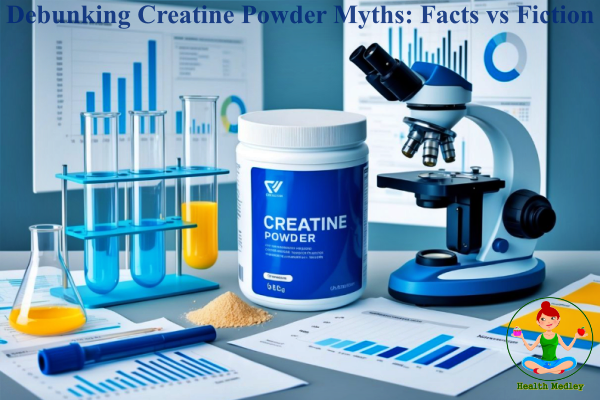Creatine is among the most popular body supplements that weightlifters use. This supplement is very helpful to combat fatigue levels during workouts which allow you to prolong your workout routine. Ultimately, creatine is highly efficient in improving your strength and the muscle size. It takes care of wear and tear of the muscle and provides you with great strength to carry out high-intensity workouts easily.
Debunking Creatine Supplement Myths: Facts vs Fiction
Unfortunately, creatine has been surrounded by a number of myths and misconceptions. The people are actually wary of creatine supplement side effects even though there aren’t many of them. Let us debunk these popular myths.
Creatine Powder leads to Liver and Kidney Damage
One of the biggest myths surrounding the side effects of creatine powder is the negative effect the supplement has on the liver and kidney. The overall controversy surrounding creatine arises from the fact that it is similar in name to creatinine, a marker which is helpful to diagnose most of the kidney problems. A number of studies have confirmed that usage of creatine does not affect the blood filtration function of the kidneys.
Creatine Supplement leads to Gastrointestinal Distress
Although it is somewhat true that side effects of prolonged creatine use include minor Gastrointestinal Distress, however, the cases in which it occurs are very rare. Only 5-7% of the people who consume creatine for workout purposes experience stomachaches. Most of such problems occur when you consume creatine on an empty stomach or consume too much of creatine at a single time.
Creatine may lead to Effects of Cramping and Dehydration on Body
Another very popular myth about creatine side effects is that the supplement leads to dehydration and cramping, especially in humid conditions. However, the truth is as far apart from the myth as possible.
Instead, the use of creatine supplements has been proven to increase the total amount of water in your body which helps to maintain the overall hydration status of your body. These supplements have no adverse effects on your muscle which can lead to cramping.Excess Use of Creatine can lead to Compartment Syndrome
The compartment syndrome is a special condition which occurs when you put excessive pressure on the muscle compartment. While usage of creatine can theoretically lead to the syndrome because of fluid retention and increasing the muscle size, the main factor for the cause of the syndrome is injury or treatments for an injury.
Creatine Usage can lead to Rhabdomyolysis
This myth regarding creatine supplement side effects became very popular among the media when New York Times published an article claiming that the usage of creatine supplements could be linked to the Rhabdomyolysis in football players. This condition is a case of a severe breakdown of the skeletal muscles of the body due to any injury to the body.
Additionally, the condition can also be a result of performing high-intensity exercises regularly in hot weather conditions. However, there was no proof that creatine consumption leads to this condition directly. In fact, Creatine is known for increasing the water retention in your body, lowering your body temperature and reducing your heart rate while exercising.
Creatine can cause You to Gain Weight
While one of the side effects of creatine includes a weight gain of about 2% of your body weight because of the increasing level of water retention, it is very unlikely that it will continue to happen if you take a small dose of the supplement. Consuming creatine alongside resistance training can lead to the decrease in fat mass and an increase in the lean body mass.








Does creatine shrinks the penis?